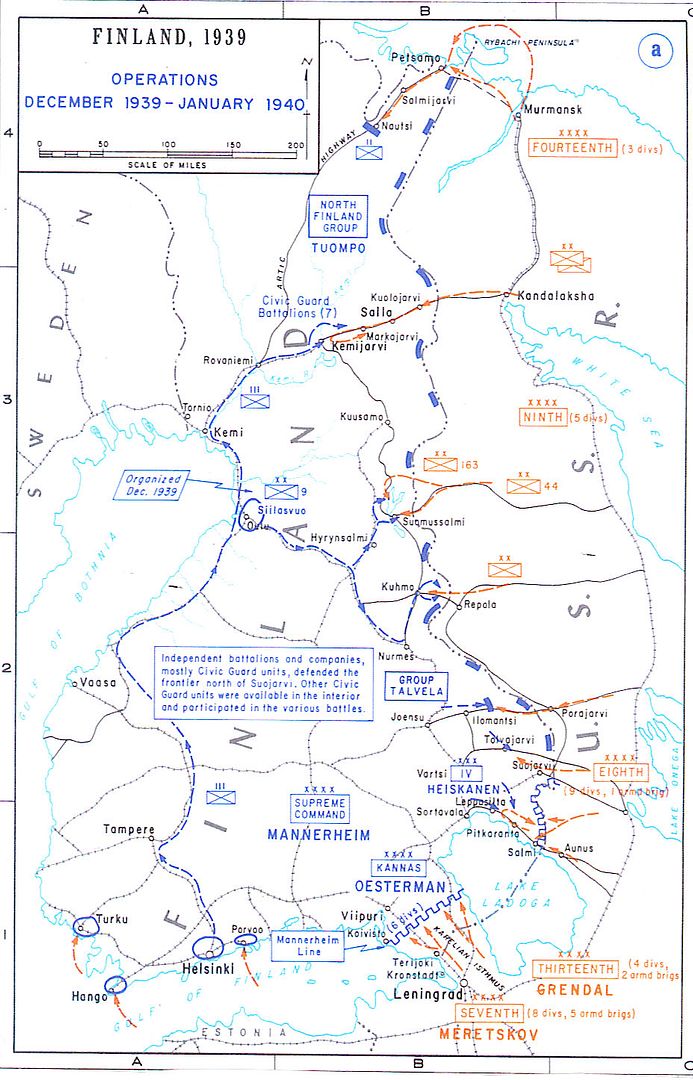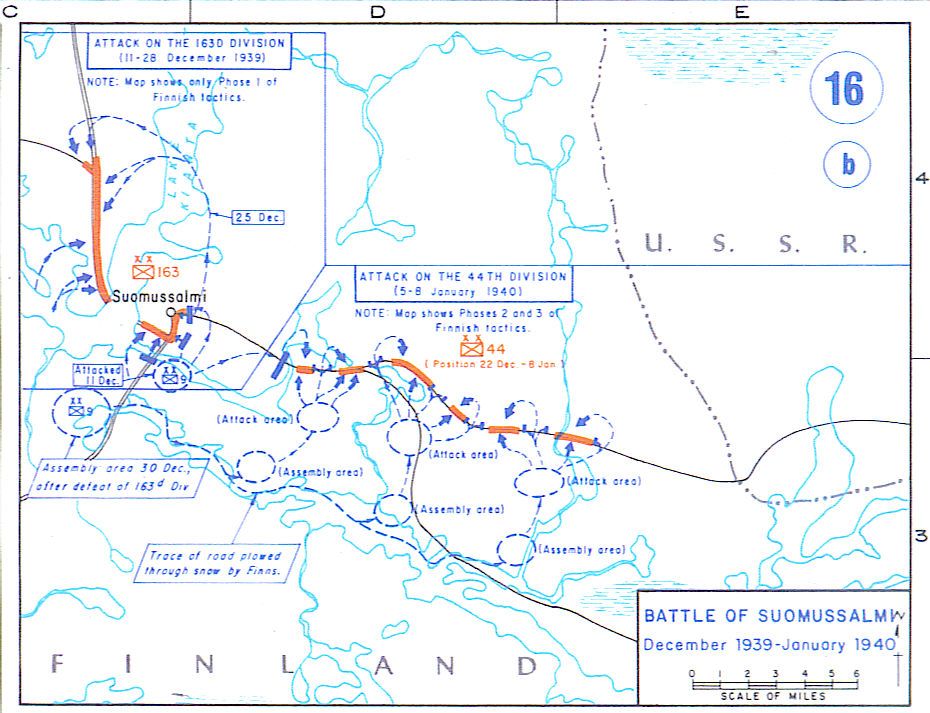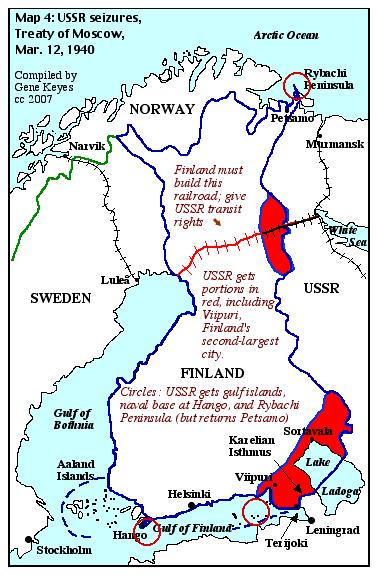
Posted on 12/22/2009 4:43:59 AM PST by Homer_J_Simpson
















http://www.onwar.com/chrono/1939/dec39/f22dec39.htm
Red Army suffers defeats in Finland
Friday, December 22, 1939 www.onwar.com
In the Winter War... The main Soviet attacks against the Mannerheim Line, around Summa, continues with less force. Meanwhile, Finnish forces catch the Soviet 44th Motorized Division as it approaches Suomussalmi to attempt the relief of the trapped Soviet 163rd Division. The Finns block the road in front and behind the Soviet force and inflict enormous casualties in the ensuing close quarter fighting.
In Bucharest... Romania signs a trade convention with Germany.
In Paris... The Chamber of Deputies votes credits of 304 billion francs for the production of armaments in 1940. Prime Minister Daladier announces the strengthening of the Maginot Line and the completion of new fortifications in northern France and the Jura Mountains.
In London... The British Ministry of Economic Warfare announces that the Allied Contraband Control has detained 870,000 tonnes of goods destined for Germany, since September 3rd.
http://homepage.ntlworld.com/andrew.etherington/month/thismonth/22.htm
December 22nd, 1939
UNITED KINGDOM: The government states that it has seized 870,000 tons of goods destined for Germany since the war began.
Minesweeping trawler HMS Dromio sunk in collision off Whitby. (Dave Shirlaw)
NORWAY: Norway’s Defence Minister, Christian Frederik Monson is replaced by Colonel Birger Ljundberg. (Greg Kelley)
FINLAND: The Finns caught the Russian 44th Motorised Division as it approached Suomussalmi to attempt the relief of the trapped 163rd Division.
The Finns blocked the road in front of and behind the Russians and used their ‘motti’ tactics using Suomi sub-machine guns, very effective weapons for close range forest work, then going in with grenades and knives.
ROMANIA: Bucharest: Romania signs a trade convention with Germany.
INDIA: Viceroy, Lord Linlithgow recognises the Muslim League. Jinnah celebrates by declaring today a “day of deliverance and thanksgiving” to be observed by all Muslims in gratitude for their release from the “tyranny, oppression and injustice” of Congress Raj in the provinces.
ATLANTIC OCEAN: U-61 damaged SS Gryfevale. (Dave Shirlaw)
I saw a documentary about this. The Finns sure fought hard for that land but the Russians’ willingness to send their people to certain death won that territory. Which they still own. I wonder if there’s any desire by the Finns to have it back.
There is a nostalgic longing for the lost lands, especially Karelia, but hardly any ethnic Finns, Karelians, or Sami live there any more, mostly Russians.
I didn't know Hitler and Stalin swung that way.
I have also been looking on YouTube and it looks like there are some decent foreign films on the Winter War. Here is a trailer of a film called The Winter War - Talvisota
Me too. If they had just a little more help that little country could have completely repelled the Soviet Juggernaut. Even so, what they were able to accomplish vs impossible odds is why Helsinki is still known by that name. What Americans accomplished against the might British is astounding which is possible why I admire what the Finns did.
I should have proof read that a little more, yikes!
Here is an article about the White Death. Simo Häyhä, a Finnish sniper, killed 542 Russians through the course of the war.
Here is a U.S. intelligence report on Finnish tactics in WWII from Tactical and Technical Trends, No. 6, August 27, 1942.
Wow, thanks for the links. I guess a little research would tell me why the Russians chose to invade in winter but I’ll take the quick answer. Do you know?
The subject of White Death came up on November 30, the day the invasion began.
See Virginia Ridgerunner's reply #11.
The quick answer is since the USSR politically split Europe with Germany, they wanted to reap the benefits of this strategically ASAP. Also, they didn't expect much resistance from Finland(think the Baltic countries and Eastern Poland). Russian generals were promising Stalin a quick and easy victory which added to Russian arrogance.
The politics are mostly spelled out in the the Molotov-Ribbentrop Pact.
Arrogance is highlighted in an excerpt from this article from encyclopedia.com.
"Although Stalin showed a genuine readiness to bargain at the Moscow talks, Finland would not compromise. Stalin fell back on an alternative plan: the Leningrad military district would mount a full invasion of Finland. Serious resistance was not anticipated because Finnish workers would welcome the Soviets as liberators and refuse to fight: to encourage them a Finnish Peoples' government was formed by communist exiles led by O. W. Kuusinen to collaborate with the invasion."
The strategic reasons can be highlighted by the final Soviet demands in the Treaty of Moscow in the following picture.


The first 150-bed field ambulance from the Swedish Red Cross arrives in Finland.
Photo: SA-KUVA
Enemy losses at Tolvajärvi-Ägläjärvi exceed 2,000
"France had been one of the earliest supporters of Finland during the Winter War. The French saw an opportunity to weaken Germany's major ally if the Finns were to attack the Soviet Union."France had other motives as well, because it preferred to have a major war in a remote part of Europe over one on French soil. France planned to re-arm the Polish exile units and transport them to the Finnish Arctic port of Petsamo. Another scheme was to execute a massive air strike with Turkish co-operation against the Caucasus oil fields.
"The British, for their part, wanted to block the flow of iron ore from Swedish mines to Germany, because the Swedes supplied up to 40 percent of Germany's need. The matter was raised by the British Admiral Reginald Plunkett on 18 September 1939, and the next day Winston Churchill brought the subject in the Cabinet.
"On 11 December Churchill opined that the British should gain a foothold in Scandinavia with the objective of helping the Finns, but without a war on the Soviet Union. Because of the heavy German reliance on Swedish iron, Hitler had made it clear to the Swedish government in December that any Allied troops on Swedish soil would immediately provoke a German invasion.
"On 19 December the French Prime Minister Édouard Daladier introduced his plan to the General Staff and the British War Cabinet.
"In his plan, Daladier created linkage between the war in Finland and the iron ore in Sweden. There was a danger of Finland's collapse under Soviet hegemony. In turn, Nazi Germany could occupy both Norway and Sweden. These two dictatorships could divide Scandinavia between them, as they had already done with Poland.
"The main motivation of France was to export the European battle front to Scandinavia in order to protect French soil, whereas the British were concerned with reducing the German war-making ability.
"The Military Coordination Committee met the next day in London and two days later the French plan was put forward. The Supreme War Council elected to send notes to Norway and Sweden on 27 December in which they urged the Norwegians and Swedes to help Finland and offer the Allies their support.
"Norway and Sweden rejected the offer on 5 January 1940.
"The Allies then came up with a new plan, in which they would demand that Norway and Sweden give them right of passage by citing the League of Nations resolution as justification. The expedition troops would disembark at the Norwegian port of Narvik and proceed by rail toward Finland, passing through the Swedish ore fields on the way.
"This demand was sent to Norway and Sweden on 6 January, but it too was rejected six days later.
"Stymied but not yet dissuaded from the possibility of action, the Allies formulated a new plan on 29 January.
"First, the Finns would make a formal request for assistance. Then the Allies would ask Norway and Sweden for permission to move the "volunteers" across their territory. Finally, in order to protect the supply line from German actions, the Allies would send additional units ashore at Namsos, Bergen, and Trondheim.
"The operation would require 100,000 British and 35,000 French soldiers with naval and air support. The supply convoys would sail on 12 March and the landings would begin on 20 March.
Peace of Moscow
"The Moscow Peace Treaty was signed on 12 March 1940 and went into effect the following day."
It's also interesting to see how ambitious these French plans were considering how pedestrian their defensive strategy was.
Disclaimer: Opinions posted on Free Republic are those of the individual posters and do not necessarily represent the opinion of Free Republic or its management. All materials posted herein are protected by copyright law and the exemption for fair use of copyrighted works.